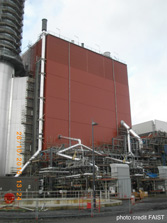Industrial soundproofing is the implementation of actions of fight against noise in relation to industry needs, which are the basis of an important part of the activity of ITS. Among those actions, one can distinguish:
- actions at source, which are to reduce noise emissions from industrial noise sources
- protection of persons from industrial noise
- measures to limit noise propagation
This domain is basing an important part of the activity of ITS.
As appropriate, industrial soundproofing may use different areas of expertise:
- acoustic metrology, when it comes to quantifying the noise emissions of a noise source (machinery, equipment, ...) or the performance of products or construction systems in a laboratory or on site (materials for sound insulation, partitions, silencers ...) or the performance of sets such as enclosures (acoustic hoods), premises and buildings (in terms of sound insulation or in terms of reverberation) or when it comes to the characterization of an acoustic situation (e.g. the source of a discomfort) in accordance with applicable standards.
Read more A noise generator is sometimes used for measurement related to industrial soundproofing e.g. to quantify the reverberation of a room or to evaluate the spatial sound decay (except for the open offices where it is necessary to use a omnidirectional noise source, often dodecahedral, an hemispheric noise is then used).
end faq - modeling, when it comes to simulate the performance of products or construction systems (materials for acoustic insulation, walls, silencers ...) or the performance of sets such as enclosures (acoustic hoods), premises and buildings (in terms of sound insulation or in terms of reverberation) or the impact of a noise source for a given environment.
Read more The modeling can concern the propagation of noise inside premises e.g. in the context of the improvement of the working conditions (if it is to protect operators from noise nuisance due to machines, production lines) or outdoor when it comes to protect the neighborhood against annoyance due to noise emissions from equipment installed outside or due to a building envelope (walls, roof) whose performance in terms of insulation are insufficient to oppose the transmission of noise e.g. from production halls.
end faq - construction technologies (metal, wood, masonry ...) including the selection of products and construction systems (for sound insulation or soundproofing equipment or for reverberation control systems) possibly in the context of the construction / refurbishment of buildings with the management of related features in connection with the building process (mechanical strength, fire performance, thermal insulation, ...) and with the mastering of technical implementation according to applicable regulations, guidelines and rules of the Art.
Read more The processes related to boilermaking are put into play when it is necessary to manufacture industrial silencers e.g. for exhaust lines of engines or gas turbines or for the depressurization of gas, those related to the mechanical welding, sheet metal work and paneling are used for the construction of ventilation silencers, enclosures and boxes for soundproofing, acoustic correction works for premises e.g. absorbent suspended ceilings, baffles or wall coverings being as for them finishing works in the buildings.
end faq - knowledge of various industrial processes involving equipment generating specific constraints and sometimes antagonistic with respect to acoustics (e.g. those linked to aerodynamics in general and to the treatment of hot or cold gas flows in particular in the area of energy or for test benches and testing rooms), and of the physics of heat transfer (in the field of production of heat, cooling, ...).
Read more In order to be able to deal with the complex problems of many industrial soundproofing projects, it is useful to have the multi-disciplinary skills to be put into play to take into account the process conditions specific to each installation: nothing beats practice over time.
end faq - familiarity with various industrial noise sources (machinery & equipment of all types) and with related requirements for example in terms of ergonomics with respect to many projects related to the fight against noise at work (for accounting in a correct way constraints related to the tasks of production and maintenance).
Read more An acoustician intervenes in all kinds of production or processing sites in the industry sector (e.g. metals and other mining products, wood, chemicals, food, pharmaceuticals, oil and gas), and is confronted with noisy equipment of all types, certain being recurring e.g. refrigeration units, engines, air conditioning networks and other being specific for an industrial activity.
end faq

industrial soundproofing |
In relation to industrial soundproofing, diagnosis (if necessary based on acoustic measurements) of situations of noise pollution (sound disturbance to neighbors, noise in the workplace, etc ...) or of discomfort in terms of acoustics (poor quality of constructions, occurrence of exceeded noise limits) research and recommendation of solutions in terms of soundproofing or acoustic comfort, supply of sound insulation materials and equipment (standard or custom), acoustic insulation design and works (of current technicity or high tech) turnkey with guaranteed results for a single project (e.g. in relation to the end user of a noisy real estate good or equipment) or for recurring needs (e.g. in relation to builders: support for developing industrialized solutions to fight against noise or for acoustic comfort): possible means of intervention of ITS with respect to all projects in relation to acoustics are as varied as the needs.
| See the frequently asked questions related to this article |
ITS intervenes for industrial soundproofing: enclosures, screens, noise barriers, acoustic insulation, silencers.